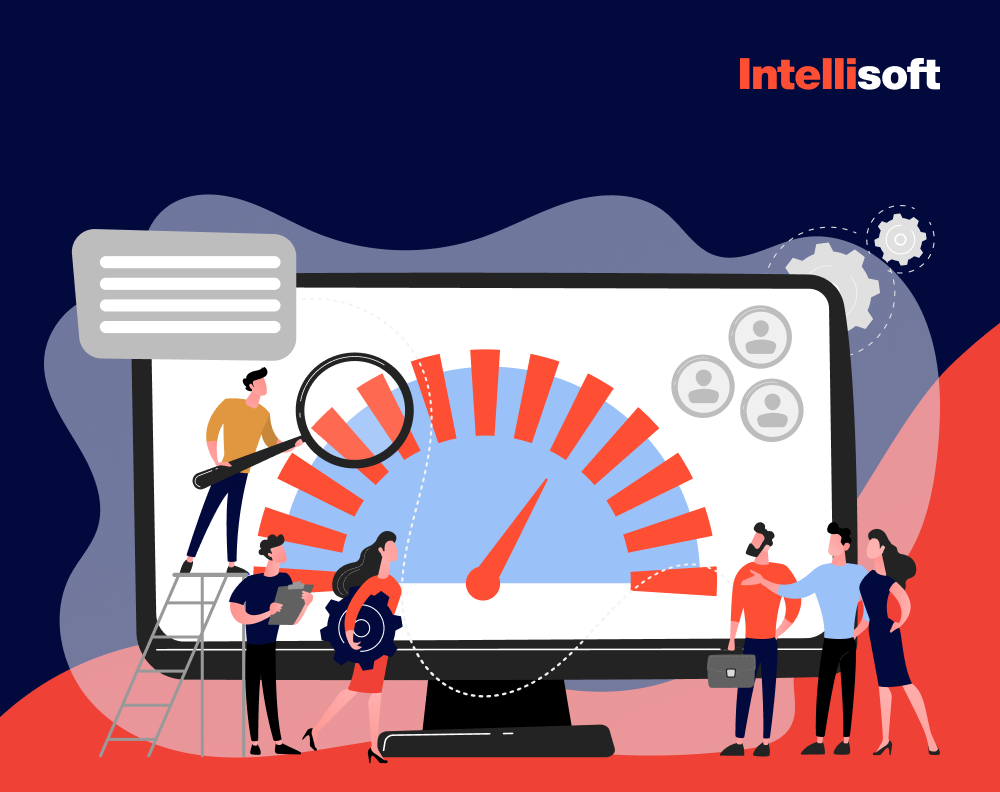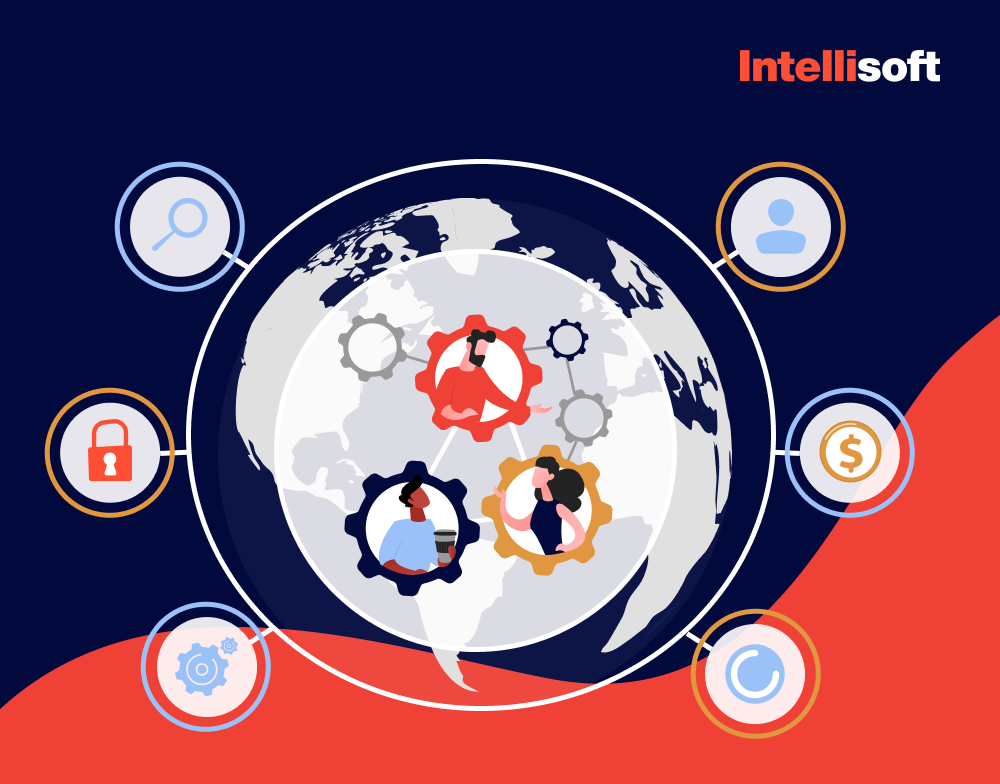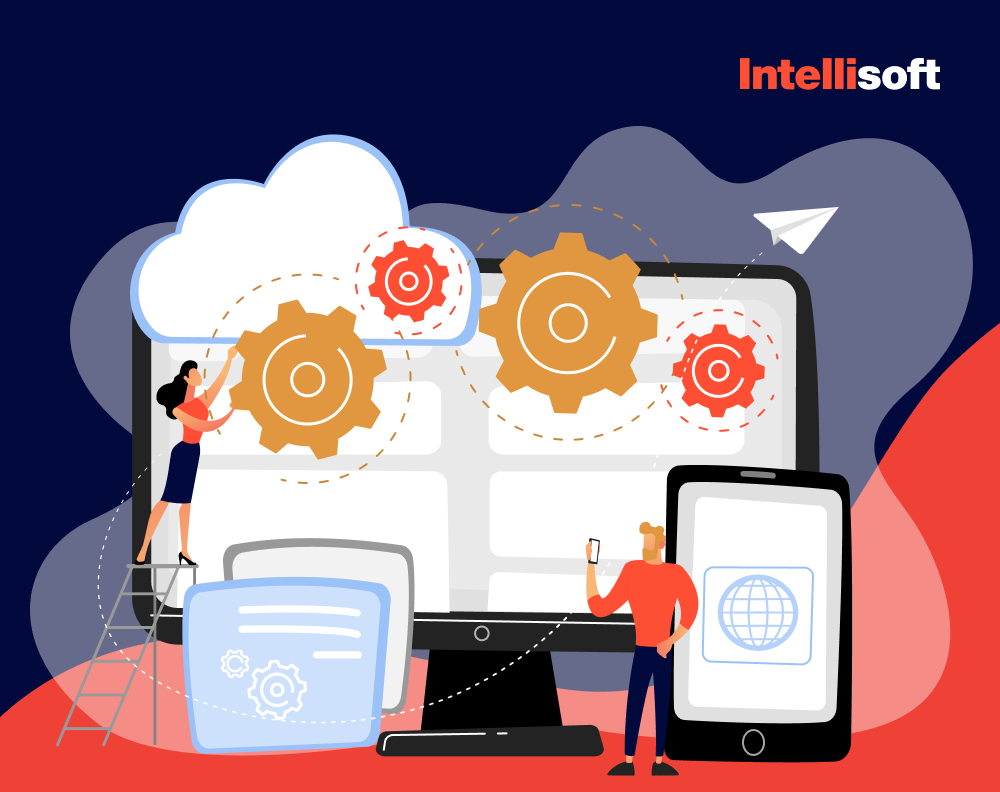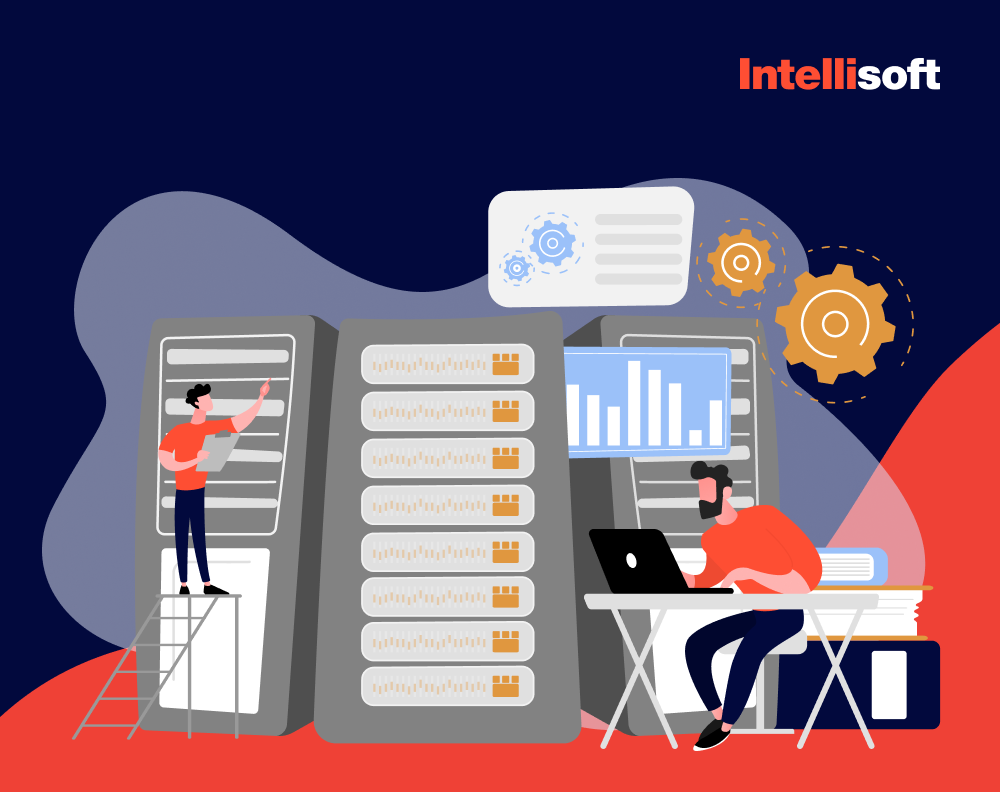IT projects outsourcing can feel like walking a tightrope – on one side, you’re eager to save time and resources, while on the other, you worry about losing control or compromising quality. The reality is that businesses today face mounting pressure to innovate fast while keeping costs low. But trying to do it all in-house? That can quickly become a bottleneck, draining your team’s bandwidth and budget.
Here’s where outsourced IT projects come in. With over 15 years of expertise in IT projects outsourcing, IntelliSoft, a project outsourcing company, has helped businesses streamline their operations, meet deadlines, and drive innovation without the usual headaches. We understand the delicate balance between control and delegation and ensure you never feel like you’re compromising one for the other. Let’s explore what is project outsourcing.
Table of Contents
Understanding IT Project Outsourcing
Think of outsourced IT projects as bringing in a helping hand when the workload gets too much to handle. It’s not just about cutting costs – it’s about teaming up with experts who can do what they do best, so you can focus on what you do best. Whether it’s a complex software development project or managing your IT infrastructure, outsourcing allows you to offload specific tasks to professionals who know the ropes.
Picture these in-house development examples: Your in-house team is juggling multiple priorities, and adding one more thing to their plate could lead to burnout or missed deadlines. That’s where IT outsourcing projects comes in. Project outsourcing meaning is like having a support system, a group of specialists ready to step in, tackle the hard stuff, and deliver results without the stress of overburdening your internal team. It gives you the flexibility to scale up when needed, and the freedom to focus on your bigger business goals without worrying about technical roadblocks.
But let’s be clear – outsourced IT projects aren’t just about sending work out the door and hoping for the best. What is the best example of outsourcing? It’s about creating a genuine partnership built on trust, communication, and shared goals. Finding the right partner, such as IntelliSoft, with years of experience in delivering tailored IT solutions feels less like outsourcing and more like gaining an extension of your own team. It’s the perfect blend of collaboration and expertise, helping your business move forward faster, smarter, and with fewer headaches.
IT Projects Outsourcing in Numbers
In 2024, the global IT outsourcing market will hit an impressive $541.1 billion. The growing demand for specialized services like cloud computing, cybersecurity, and software development largely fuels this surge.
What is outsourcing in project management? With more businesses recognizing the value of outsourcing to gain access to expert talent and cutting-edge technology, the market is set to continue expanding at a compound annual growth rate (CAGR) of 10.99%. If this trend holds, the global market could reach $777.7 billion by 2028.
The United States remains a key player in this space, where outsourced IT projects are forecasted to generate $185.5 billion in revenue by 2024. As American companies continue to look for cost-effective IT solutions and adopt emerging technologies such as artificial intelligence (AI) and robotic process automation (RPA), the market is expected to grow at a 10.71% CAGR, pushing it to $278.7 billion by 2028.
These figures highlight a global shift towards outsourcing IT services as companies seek cost savings, specialized skills, and faster digital transformation to stay competitive in an ever-evolving tech landscape.
Related Readings:
- Outsourcing vs Offshoring: Discover Which Model Maximizes Efficiency?
- Best Countries To Outsource Software Development
- Hire Developers for Startup: Key Strategies for Success
- Everything You Need to Know About Team Extension and Dedicated Team Models
- Outsourcing vs. Outstaffing Models: What Is the Difference and Their Pros & Cons
Ways Outsourcing IT Projects Can Support Your Business
Let’s face it – IT projects can be overwhelming. From keeping up with the latest technologies to making sure everything runs smoothly, managing these tasks in-house can stretch your team thin. But it doesn’t have to be that way. When you outsource IT project, it can feel like a breath of fresh air, offering solutions to issues that might have kept you up at night. Here’s how examples of outsourcing can actually take a load off your shoulders and help your business grow.
Advantages to outsourced project work can include:
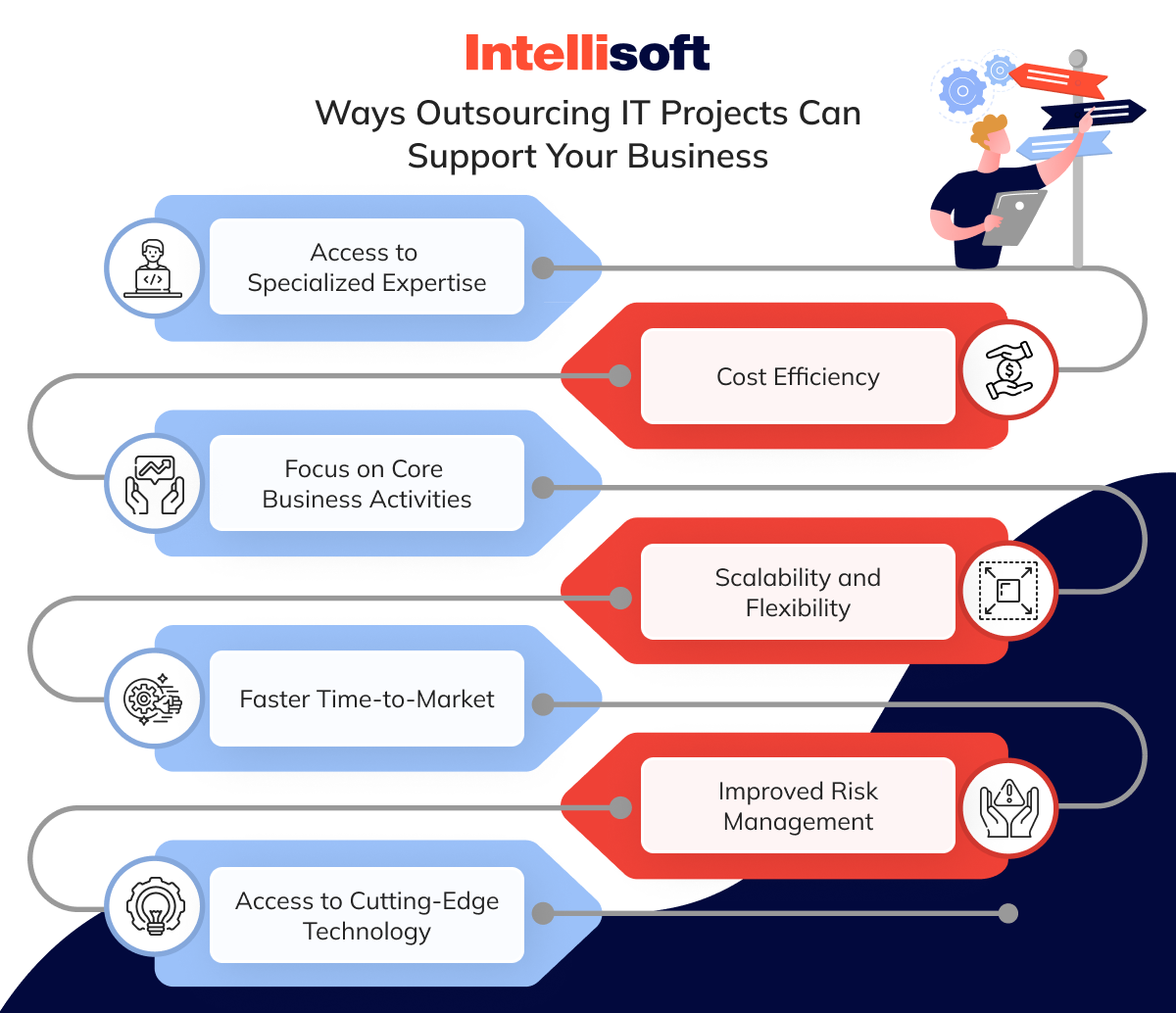
Access to Specialized Expertise
Imagine having access to a pool of tech wizards who can jump in whenever you need them. That’s what outsourcing project work offers – experts who live and breathe IT, and who are already up to speed on the latest tools and trends. They bring specialized skills that would take months or years to cultivate in-house. Whether you need to revamp your cybersecurity or develop cutting-edge software, these specialists come fully equipped. No more long nights of figuring out complex systems – you’ve got pros to handle that.
Cost Efficiency
We all know running an in-house IT team can get expensive – paying salaries, benefits, and equipment costs – and it adds up fast. An outsource project flips the script. You pay for what you need, when you need it. If your project slows down, you aren’t stuck paying for a full-time team twiddling their thumbs. Plus, IT project outsourcing companies often have access to resources and technology that would cost you a small fortune to set up internally. Think of it as high-quality service without the high-maintenance price tag.
Focus on Core Business Activities
You started your business because you had a vision – one that probably didn’t involve troubleshooting server issues or setting up cloud storage. By outsourcing IT tasks, you can get back to focusing on what you do best; growing your business, delighting customers, and pushing innovation. Let your team concentrate on the strategic decisions that move the needle, while the technical stuff is handled elsewhere.
Scalability and Flexibility
Your business isn’t static, and your IT needs shouldn’t be either. When you outsource, you get the flexibility to adjust resources based on what’s happening right now. Are you gearing up for a big product launch? No problem – your outsourcing partner can bring in additional support. Experiencing a slower season? You can scale back without the headache of layoffs or wasted resources. This adaptability makes it easier to ride the waves of business growth.
Faster Time-to-Market
Got a tight deadline? Outsourcing helps you get projects off the ground faster. With a dedicated team already familiar with the tools and processes needed to get the job done, you can avoid the typical delays caused by in-house bottlenecks. Time is money, and in this case, outsourcing can mean getting your product to market before your competitors even know what hit them.
Improved Risk Management
Every IT project comes with its fair share of risks – whether it’s data security, regulatory compliance, or simple project delays. Experienced partners with outsourcing in project management have seen it all before and have systems in place to manage those risks efficiently. It’s like having a safety net beneath your project, ready to catch any potential problems before they turn into disasters.
Access to Cutting-Edge Technology
What is an example of outsourcing? Tech moves fast, and trying to keep up can feel like a full-time job. When you outsource, you gain immediate access to the latest innovations without having to lift a finger. Your outsourcing partner stays on top of things for you, ensuring that you’re always working with the best tools available. It’s like getting a backstage pass to the future – without the hefty price of admission.
IT Project Outsourcing in Various Industries
IT project outsourcing has transformed the way industries operate, from healthcare to retail. By collaborating with specialized external teams, businesses can streamline processes, boost efficiency, and scale with flexibility. Here’s a closer look at how different industries leverage outsourcing to stay competitive and innovate.
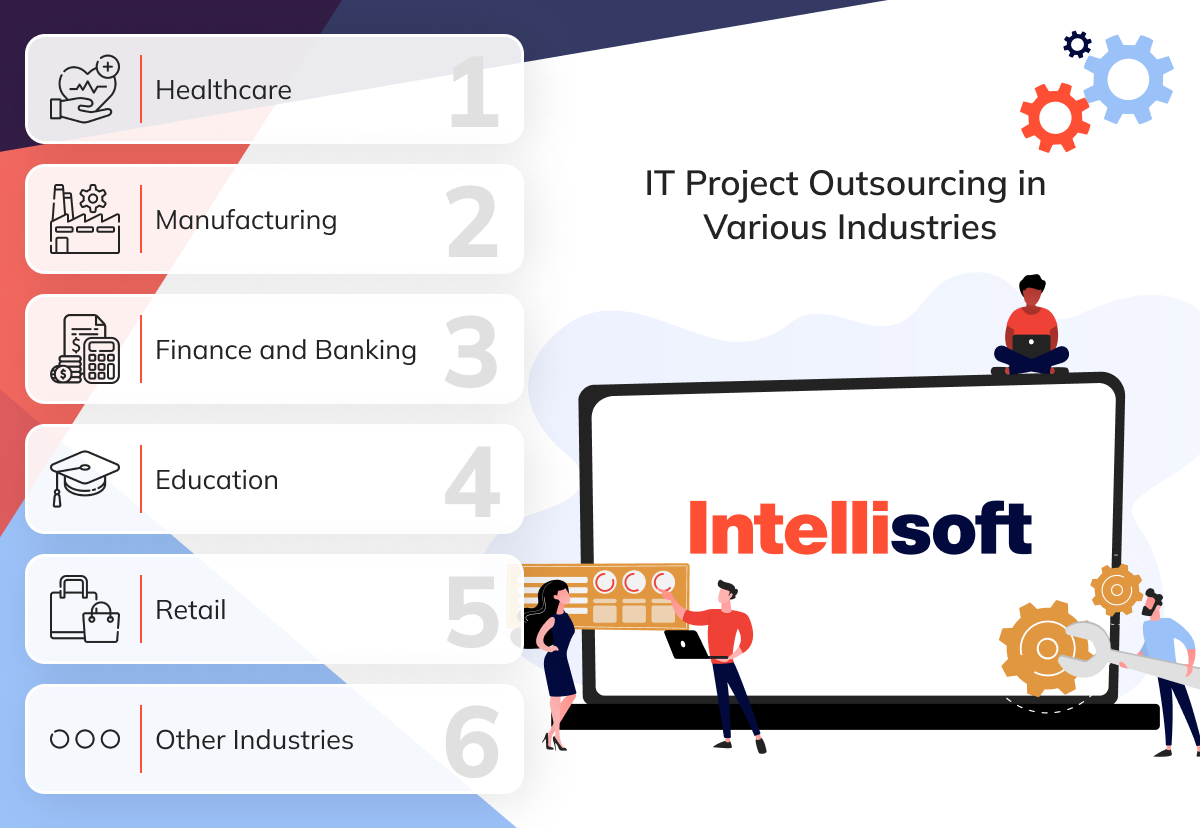
Healthcare
The healthcare industry faces the dual challenge of managing sensitive patient data while keeping up with rapidly advancing medical technology. Outsourcing IT projects enables healthcare providers to implement electronic health records (EHR), telemedicine platforms, and data security systems without diverting focus from patient care. Outsourcing also brings in experts who specialize in HIPAA compliance and data protection, ensuring that patient information remains secure and private.
With healthcare providers outsourcing projects like cloud-based patient management systems and AI-driven diagnostic tools, they can keep up with innovations while improving patient outcomes. By working with IT specialists, healthcare companies can focus on what they do best – saving lives.
Manufacturing
Manufacturing companies are increasingly adopting technologies such as IoT, automation, and AI to enhance production efficiency. However, setting up these systems internally requires significant investment in both time and resources. Outsourcing IT allows manufacturers to quickly integrate advanced technologies without pausing production or stretching their in-house teams too thin.
From managing supply chain systems to creating predictive maintenance platforms, outsourcing provides manufacturing companies with the expertise needed to optimize operations. It also helps them respond faster to changes in demand, reduce downtime, and improve overall productivity by allowing their internal teams to focus on core business activities.
Finance and Banking
The finance and banking sector must navigate stringent regulations while embracing digital transformation. IT outsourcing examples projects such as cybersecurity, fraud detection systems, and mobile banking app development allows financial institutions to innovate securely. Outsourcing partners bring in critical knowledge about compliance standards like PCI-DSS, ensuring that banking institutions can operate smoothly and securely.
For banks, having an outsourcing partner handle the complexities of security protocols and infrastructure management allows their in-house teams to focus on customer service and improving financial products. It’s a partnership that fosters both innovation and trust in a highly regulated industry.
Education
The education sector has undergone a digital revolution, with online learning platforms, student management systems, and virtual classrooms becoming the norm. Outsourcing IT projects enables educational institutions to develop and maintain these platforms without needing in-house tech expertise.
By partnering with outsourcing firms, schools and universities can focus on delivering quality education while ensuring that their digital tools run smoothly. Whether it’s creating e-learning platforms or integrating AI for personalized learning experiences, outsourcing has become a key enabler for educational institutions to adapt to the modern needs of students.
Retail
In retail, the focus is on enhancing the customer experience, both online and in-store. Outsourcing IT projects such as e-commerce platforms, customer relationship management (CRM) systems, and inventory management solutions allows retailers to remain competitive in a digital-first world. Outsourcing also provides retailers with the flexibility to scale during peak seasons like holidays or major sales events.
Retailers can harness outsourced expertise to improve everything from website performance to personalized marketing campaigns, making sure their customers enjoy a seamless experience. As technology continues to evolve, outsourcing provides retailers the agility needed to stay ahead of market trends.
Other Industries
Across various other industries, such as logistics, telecommunications, and entertainment, outsourcing IT projects provide a way to stay on top of technological advances while maintaining focus on core operations. In logistics, companies often outsource route optimization and fleet management systems, while telecommunications firms outsource the development of mobile apps and customer service platforms. Entertainment companies outsource everything from streaming services to digital content management.
In each case, IT outsourcing services examples have the same key benefits; access to specialized expertise, scalability, cost-efficiency, and a reduced time-to-market for new initiatives.
Types of Software Projects in IT Project Outsourcing
Which is the best example of outsourcing? Outsourcing software projects enables companies to focus on innovation while experts handle the technical execution. Here are some examples of IT projects often outsourced:
Custom Software Development
Businesses often outsource the creation of tailored software solutions, such as CRM systems or enterprise applications, that align with their unique operational needs.
Mobile App Development
From conceptualization to deployment, mobile app development projects are frequently outsourced to tap into specialized skills and ensure platform compatibility.
Web Development
Another outsource example is web development. Companies outsource web development projects to create user-friendly, secure, and scalable websites, enhancing their online presence and customer engagement.
Cloud-Based Solutions
With the growing demand for cloud infrastructure, businesses outsource projects related to cloud migration, data storage, and cloud-native application development.
Software Testing & QA
To ensure product quality, businesses often outsource testing and quality assurance tasks, which include functional, security, and performance testing.
Cybersecurity Solutions
Outsourcing cybersecurity projects provides businesses with cutting-edge protection, covering everything from data encryption to vulnerability assessments and compliance management.
Outsourcing IT Projects in Various Stages
Outsourcing IT projects doesn’t have to mean outsourcing the entire process. Businesses can strategically delegate different stages of a project based on their needs. Here’s how outsourcing works at various phases of an IT project and how successful IT projects examples are built:
Conceptualization and Planning
In this initial phase, companies often outsource strategic tasks like project scoping and risk assessment, benefiting from expert insights and reducing planning time.
Development and Testing
During this critical stage, outsourcing accelerates coding, integration, and thorough testing, ensuring faster delivery and robust software performance.
Maintenance and Support
Post-launch, businesses can outsource ongoing maintenance, updates, and support, ensuring the software stays functional and secure without overburdening internal teams.
Full Lifecycle Management
For comprehensive outsourcing, companies can delegate the entire project lifecycle, from planning to maintenance, streamlining execution, and focusing on broader goals.
Successful Outsourcing Examples: IT Projects Examples
At IntelliSoft, our team has extensive experience in crafting tailored software solutions for a variety of industries, enabling businesses to overcome operational challenges and drive innovation. Whether it’s optimizing fleet management, enhancing legal tech platforms, or modernizing healthcare systems, IntelliSoft’s team of experts brings deep technical knowledge and a client-focused approach to every project and we have a lot of company projects examples. Here’s a closer look at some of our technical project examples.
IngramBarge
The Challenge
Ingram Barge, a leader in maritime logistics, faced inefficiencies due to an outdated fleet management system that struggled to handle real-time data and the operational demands of managing 5,000 barges and 140 towboats.
The Solution
IntelliSoft developed a fully integrated fleet management system with real-time data analytics, enhanced user experience, and scalability to streamline operations and improve decision-making.
The Results
The new system improved operational efficiency, optimized fleet management, and ensured future scalability, enabling cost savings and better safety compliance.
ZyLab
The Challenge
ZyLAB needed a sophisticated eDiscovery platform to handle increasing volumes of legal data and automate complex processes to stay competitive in the legal technology market.
The Solution
IntelliSoft built an advanced platform with powerful data processing, AI integration for automation, and a user-centric design that simplified legal processes while ensuring compliance with strict legal regulations.
The Results
ZyLAB’s new platform enhanced efficiency, strengthened its market position, improved user satisfaction, and easily scaled to meet client demands.
SpecTec
The Challenge
SpecTec, a maritime software leader, needed to modernize its AMOS platform to keep pace with industry demands for maintenance, spare parts, and purchasing operations management.
The Solution
IntelliSoft revamped the AMOS architecture, enhancing data processing, user experience, and compliance while ensuring scalability for diverse maritime operations.
The Results
The modernized AMOS platform improved operational efficiency, user satisfaction, and regulatory compliance, ensuring SpecTec could meet both current and future client needs.
Cambio
The Challenge
Cambio needed to upgrade its subsidiary Daintel’s critical care data management platform for ICUs, aiming for advanced analytics, real-time data integration, and better user experience.
The Solution
IntelliSoft developed a user-friendly platform with real-time data processing, enhanced analytics, and strict compliance with healthcare regulations, ensuring a scalable solution for ICU environments.
The Results
The new platform improved patient care, boosted operational efficiency, and ensured regulatory compliance, helping Cambio expand its reach and enhance ICU decision-making processes.
Evaluating IT Projects for Outsourcing
When deciding whether to outsource IT projects, businesses must evaluate several key factors. Competency gaps, technological lapses, and a shortage of internal resources can hinder project success.
Moreover, fluctuating workloads, challenging timelines, and budget constraints may further complicate internal management. In these scenarios, outsourcing to successful outsourcing companies like IntelliSoft can be a cost-effective solution to overcome these challenges and optimize project outcomes.
Defining Your Outsourcing Needs
Understanding the scope of your project and the specific expertise required is the first step. Whether it’s filling a skill gap, handling an entire development cycle, or addressing a resource shortage, clearly defining your needs helps streamline the outsourcing process and ensures alignment with the right partner.
Geographical Models of IT Projects Outsourcing
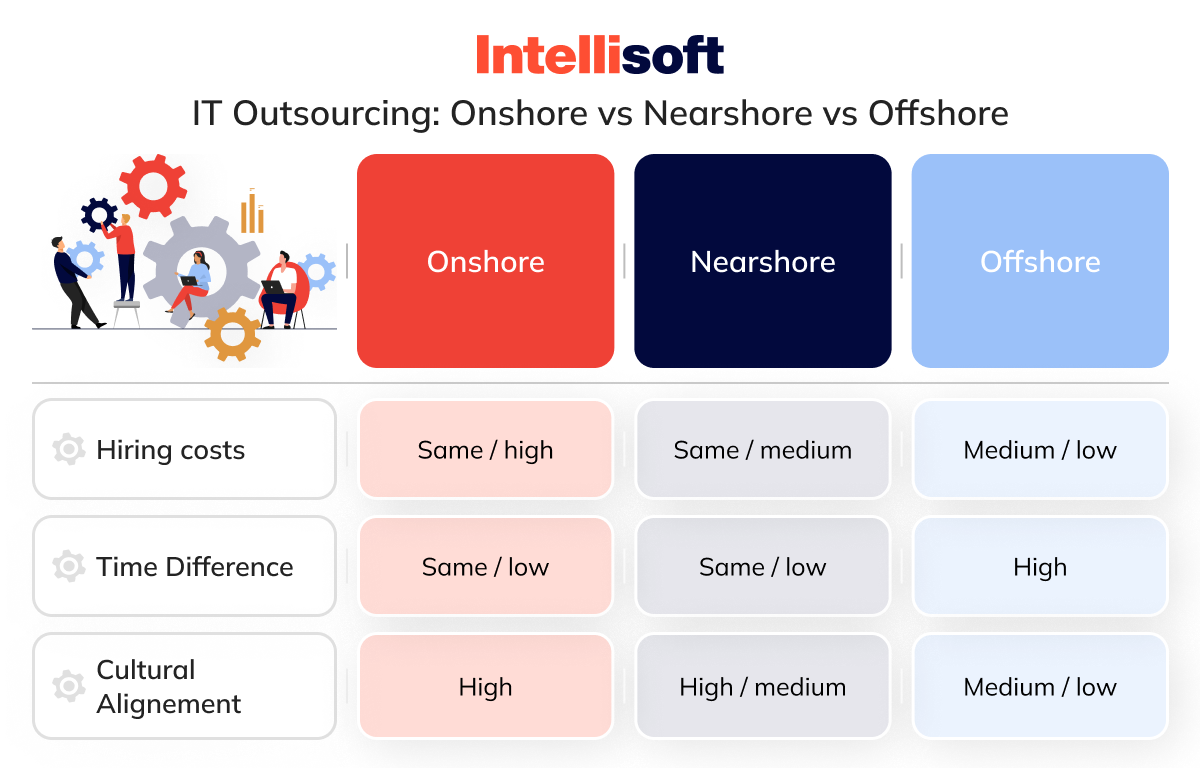
Outsourcing models vary based on geographical locations:
- Onshore. Onshore outsourcing examples are partnering with providers within your country or region offers smoother communication and time zone alignment.
- Nearshore. Working with neighboring countries balances cost-efficiency with fewer time zone differences.
- Offshore. Choosing countries far from your region provides the most cost savings but may present challenges in communication and cultural differences.
Types of IT Project Outsourcing
There are several outsourcing types depending on your project’s complexity and needs:
- Full Outsourcing. External teams manage the entire project from start to finish.
- Partial Outsourcing. A hybrid approach where in-house teams collaborate with outsourced specialists.
- Staff Augmentation. Adding specific external skills to your internal team for short-term projects or gaps.
Choosing the Right Model of Outsourcing IT Projects
The right outsourcing project plan depends on factors such as your project timeline, required expertise, and risk management:
- Project-based outsourcing. Ideal for well-defined, short-term projects.
- Dedicated team. Perfect for long-term, ongoing work requiring continuity and specialized skills.
- Managed services. Best for companies looking to outsource entire operations or IT functions continuously.
Choosing the Right Pricing Model
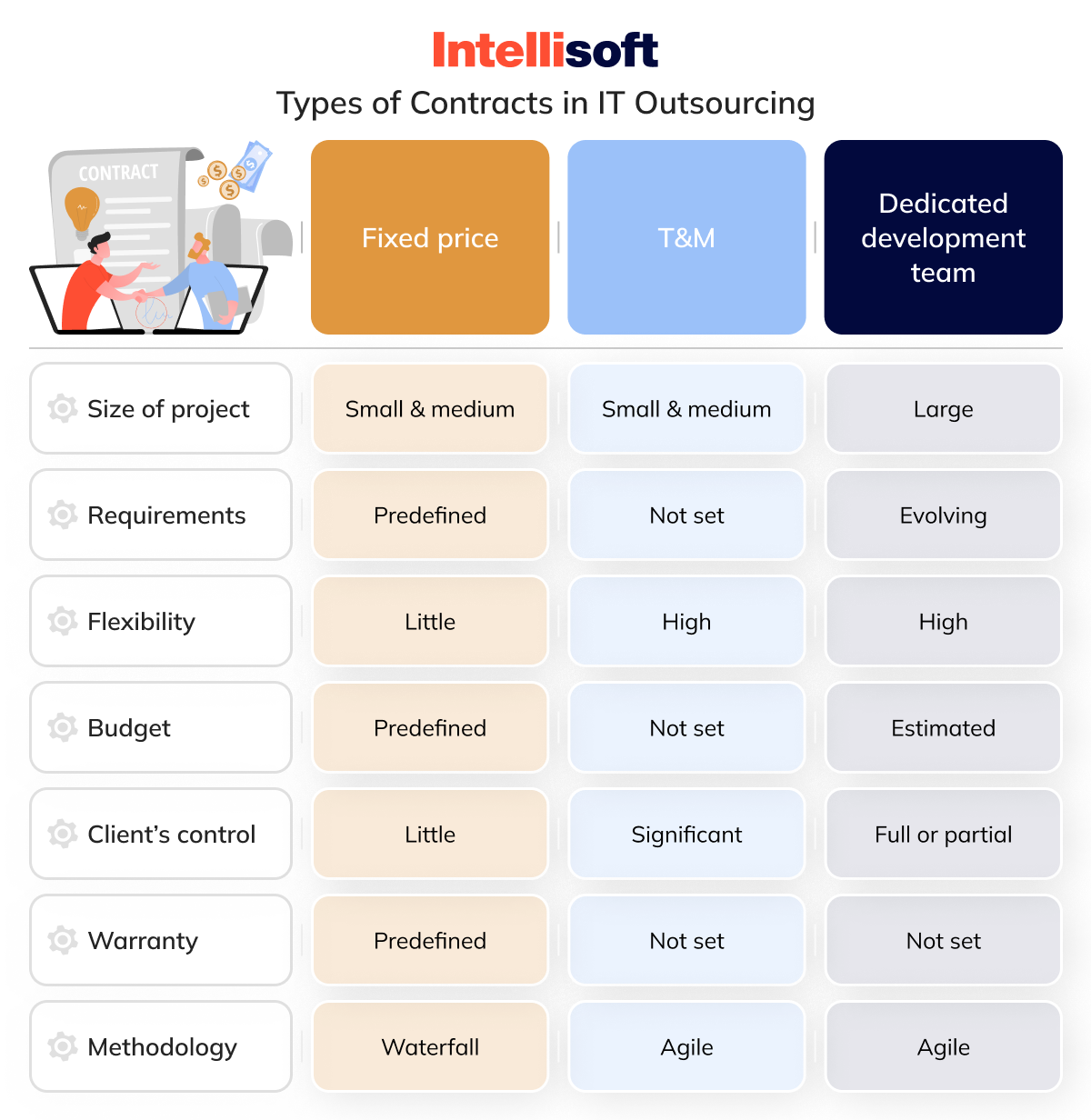
Pricing models for outsourcing typically include:
- Fixed-price. Best for projects with a clear, predefined scope and deliverables.
- Time and materials. Suitable for projects that may evolve and require flexibility.
- Dedicated team. A long-term engagement where you pay for full-time staff based on a set fee.
Conclusion
When it comes down to it, outsourcing your IT projects isn’t just about cost-saving or filling in gaps – it’s about ensuring your business thrives without the stress of managing every technical detail. Whether you’re navigating fluctuating workloads, tight deadlines, or tackling tech challenges, handing off these tasks to a trusted team can make all the difference.
At IntelliSoft, we’ve been there. Our team understands the hurdles you face and is ready to partner with you, bringing both expertise and a personal touch to each project. Ready to give your business the boost it needs? Contact IntelliSoft today, and let’s make your next IT project a success, together.


